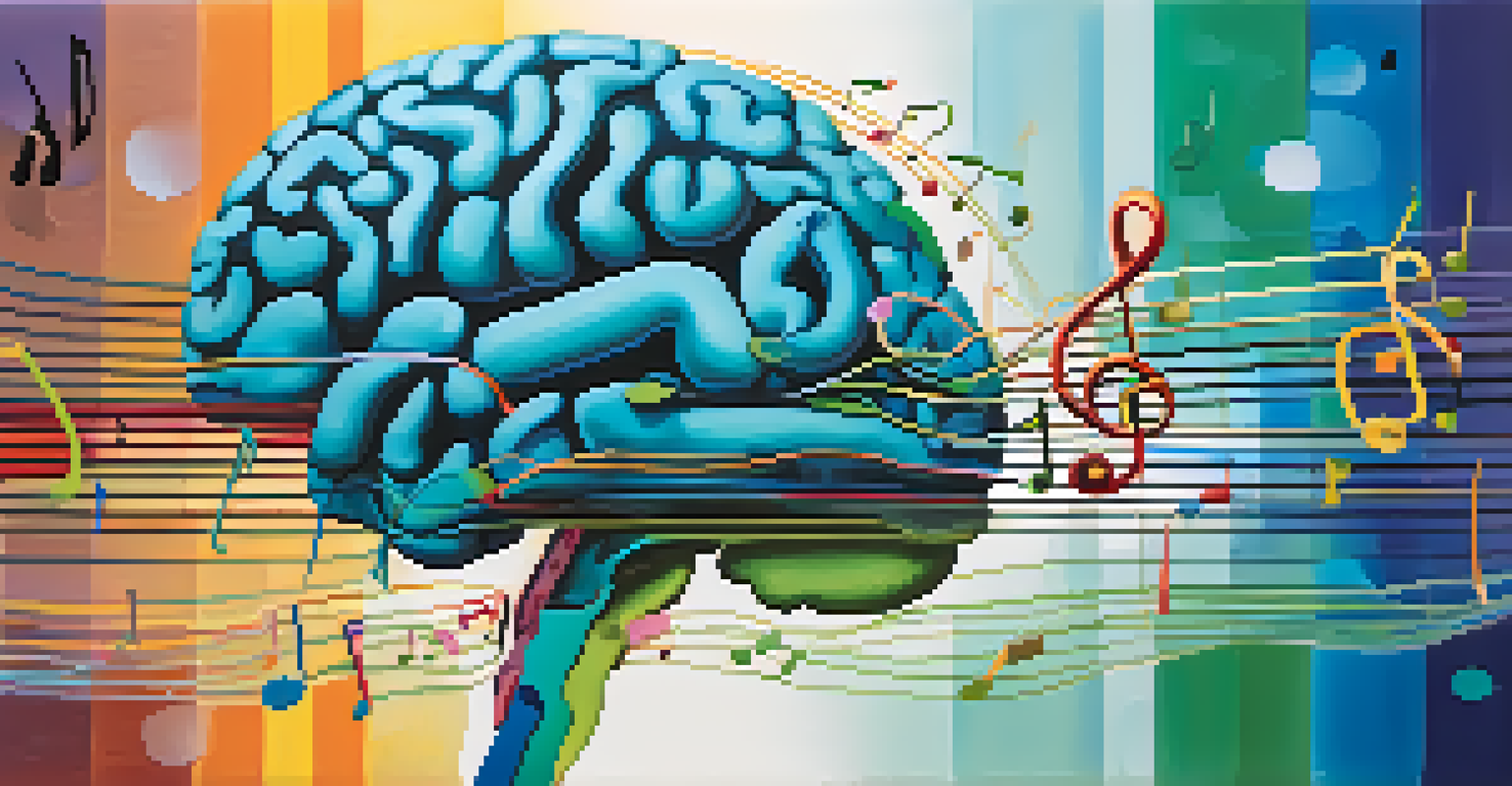The Role of Music in Enhancing Neuroplasticity

Understanding Neuroplasticity and Its Importance
Neuroplasticity refers to the brain's remarkable ability to reorganize itself by forming new neural connections throughout life. This process is crucial for learning, memory, and recovery from brain injuries. Essentially, neuroplasticity allows our brains to adapt to new experiences, making it a fundamental aspect of cognitive health.
Music can change the world because it can change people.
Imagine your brain as a bustling city, where roads (neural connections) can be built, modified, or even demolished based on traffic (experiences). When we learn something new, these roads become more defined, enhancing our ability to navigate through knowledge and skills. Neuroplasticity is what keeps our mental city thriving and evolving.
As we age or experience trauma, neuroplasticity plays a vital role in helping us regain lost abilities or learn new ones. This adaptability ensures that our cognitive functions remain sharp, enabling us to tackle challenges and embrace lifelong learning.
The Power of Music in Brain Development
Music has a unique ability to stimulate various brain regions simultaneously, activating both the emotional and analytical sides of our minds. This multisensory engagement creates a rich environment for neuroplasticity to flourish. In essence, music acts as a catalyst for brain development, especially in children.

Think of music as a workout for the brain; just as physical exercise strengthens our muscles, engaging with music can enhance cognitive functions. For instance, learning to play an instrument involves reading music, coordinating movements, and expressing emotions, all of which strengthen neural pathways.
Neuroplasticity Enhances Learning
The brain's ability to reorganize itself through neuroplasticity is essential for learning, memory, and recovery from injuries.
Research shows that children exposed to music education often perform better academically and excel in problem-solving tasks. This connection highlights how incorporating music into early education can lay a strong foundation for cognitive growth.
How Music Therapy Facilitates Recovery and Learning
Music therapy has emerged as a powerful tool for facilitating recovery in individuals with brain injuries or neurological disorders. By using music to engage patients, therapists can help them regain lost skills and improve cognitive functions. This therapeutic approach leverages the brain's neuroplasticity to promote healing and learning.
The brain is like a muscle. When it is in use, we feel very good. It is like a satisfaction of the senses.
Consider a stroke survivor who struggles with speech. Through music therapy, they might sing familiar songs, which can stimulate the brain regions responsible for language. This method not only aids in recovery but also fosters a sense of joy and motivation during the rehabilitation process.
Numerous studies have demonstrated the effectiveness of music therapy in enhancing memory, attention, and emotional regulation. As a result, music therapy is increasingly integrated into treatment plans for various conditions, underscoring its importance in harnessing neuroplasticity.
The Science Behind Music and Brain Connectivity
Recent research has shown that listening to music can enhance connectivity within the brain's networks. This increased connectivity is linked to improved cognitive functions, such as memory, attention, and executive functioning. Essentially, music not only engages us emotionally but also helps our brains communicate more effectively.
Imagine your brain's networks as a series of interconnected highways. When you listen to music, these highways become more efficient, allowing information to travel faster and more smoothly. This enhanced connectivity is particularly beneficial for tasks that require multitasking or complex problem-solving.
Music Boosts Cognitive Functions
Engaging with music stimulates various brain regions, enhancing cognitive functions such as memory, attention, and problem-solving.
Moreover, studies indicate that certain types of music, such as classical or rhythmic music, can further amplify these effects. This insight opens up exciting possibilities for using music strategically to boost cognitive performance.
Music's Role in Emotional Regulation and Mental Health
Music has a profound impact on our emotions, which can directly influence our mental health and cognitive abilities. Listening to or creating music can help regulate mood and reduce stress, creating a more conducive environment for learning and neuroplasticity. This emotional connection is vital for fostering a healthy brain.
Think of music as a soothing balm for the mind; it can calm anxiety, lift spirits, and even evoke memories. When we feel good emotionally, our brains are more receptive to learning and adapting, enhancing neuroplasticity.
Numerous studies have linked music engagement to reduced symptoms of depression and anxiety. This connection highlights the importance of incorporating music into daily routines as a means of enhancing emotional well-being and, subsequently, cognitive flexibility.
The Influence of Music on Memory and Learning
Music can significantly enhance memory retention and recall, making it a valuable tool for learning. The structure and rhythm of music can create associations that help us remember information more effectively. This phenomenon is why many students use songs or melodies to memorize facts or concepts.
Consider how many people can recall the lyrics of their favorite songs years after hearing them. This ability demonstrates how music can anchor memories, making them easier to access later on. By engaging with music, learners can create a rich tapestry of associations that aid in retaining knowledge.
Music Therapy Aids Recovery
Music therapy effectively promotes healing and skill recovery in individuals with brain injuries by leveraging neuroplasticity.
Furthermore, studies show that background music can improve concentration and increase productivity during study sessions. By strategically using music, learners can optimize their cognitive performance and support their neuroplastic development.
Practical Ways to Incorporate Music into Daily Life
Incorporating music into your daily routine can be a simple yet effective way to enhance neuroplasticity. Whether it's listening to your favorite tunes while commuting, playing an instrument, or joining a community choir, there are countless ways to engage with music. Finding what resonates with you personally can make this experience even more enjoyable.
For example, try setting aside time each day to listen to different genres of music or learn a new instrument. This not only stimulates your brain but also provides an opportunity for self-expression and creativity, which are essential for cognitive growth.

Additionally, consider creating playlists for specific activities, such as studying or exercising. The right music can elevate your mood, increase focus, and boost productivity, making it a powerful ally in your journey toward enhanced neuroplasticity.
Conclusion: Embracing Music for a Healthier Brain
In conclusion, music plays a vital role in enhancing neuroplasticity, offering numerous benefits for cognitive health and emotional well-being. By understanding how music influences brain connectivity, memory, and emotional regulation, we can harness its power to improve our lives. Embracing music in our daily routines can become a transformative practice for personal growth.
As we’ve explored, the impact of music is vast, from aiding recovery in therapy to enhancing learning outcomes in educational settings. The science behind music and neuroplasticity highlights how we can use this art form to create a healthier, more adaptable brain.
So, whether you’re strumming a guitar, singing in the shower, or simply enjoying your favorite playlist, remember that you’re not just having fun—you’re also supporting your brain’s ability to learn, adapt, and thrive.